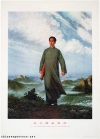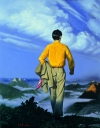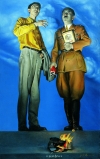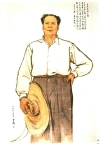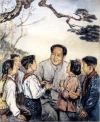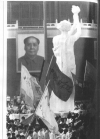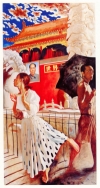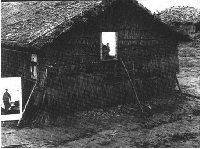
Illustration:
ill. 5.51 (set: 5.48)
Date:
ca. 1960s
Genre:
photograph
Material:
scan, paper, grayscale; original source: photograph
Source:
Yang 1995: Yang Kelin 杨克林. Wenhua da geming bowuguan 文化大革命博物馆 (Museum of the Cultural Revolution). Hong Kong: Sanlian, 1995:115/116.
Keywords:
Mao Zedong, Mao goes to Anyuan, countryside, omnipresence, Mao Cult, Mao portrait
Mao in the Countryside (Mao Zedong zai xiangcun 毛泽东在乡村)
Photographic evidence seems to support the idea that during the Cultural Revolution, Mao was quite popular—at least in one sense of the word—as much as he could be seen everywhere: in public at Tian’anmen (ill. 5.48 a&b), as well as in private at home (ill. 5.49), in the cities (ill. 5.50), as well as in the countryside (ill. 5.51, 5.62), in the factories (ill. 5.52) as well as at the universities (ill. 5.53, 5.63).
In all of these depictions, we can see images, photographs, paintings of Mao, the old and the young, or Mao the sun and pattern, hung each in a fitting size, at the most central and prominent places. But these repetitious images are not only representative to the experience of the Cultural Revolution alone.
